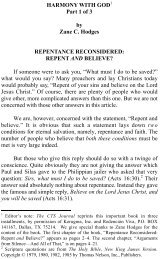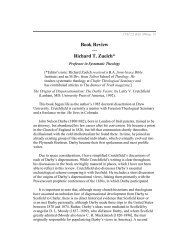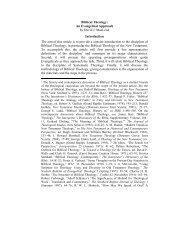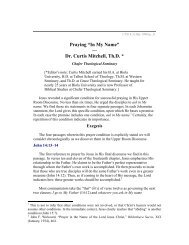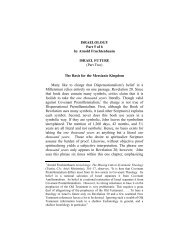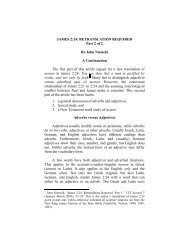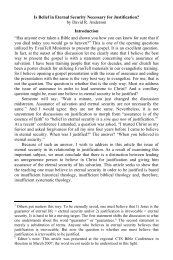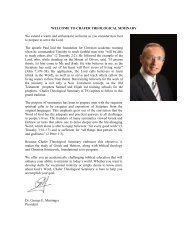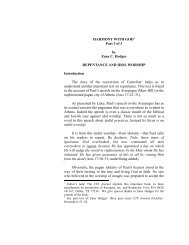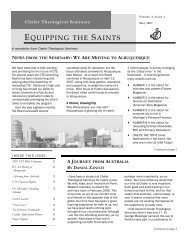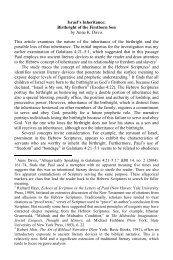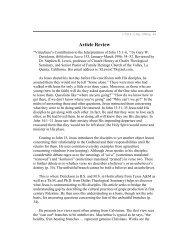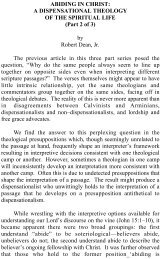BIBLICAL HERMENEUTICS - Chafer Theological Seminary
BIBLICAL HERMENEUTICS - Chafer Theological Seminary
BIBLICAL HERMENEUTICS - Chafer Theological Seminary
You also want an ePaper? Increase the reach of your titles
YUMPU automatically turns print PDFs into web optimized ePapers that Google loves.
Open Letter<br />
allowed that such occurred with nonevangelicals such as Butlmann and 9<br />
Tillich, but insisted that it not happen among those of evangelical persuasions. 27<br />
Terry supported the same quest for objectivity, expressing it in different<br />
terms:<br />
The objectionable feature of these methods [i.e., the Apologetic and Dogmatic<br />
methods] is that they virtually set out with the ostensible purpose of<br />
maintaining a preconceived hypothesis. The hypothesis may be right, but the<br />
procedure is always liable to mislead. It presents the constant temptation to find<br />
desired meanings in words and ignore the scope and general purpose of the<br />
writer. There are cases where it is well to assume a hypothesis, and use it as<br />
a means of investigation; but in all such cases the hypothesis is only assumed<br />
tentatively, not affirmed dogmatically. In the exposition of the Bible, apology<br />
and dogma have a legitimate place. The true apology defends the sacred books<br />
against an unreasonable and captious criticism, and presents their claims to be<br />
regarded as the revelation of God. But this can be done only by pursuing rational<br />
methods, and by the use of a convincing logic. So also the Scriptures are<br />
profitable for dogma, but the dogma must be shown to be a legitimate teaching<br />
of the Scripture, not a traditional idea attached to the Scripture. . . .<br />
. . . . . . . . . . . . . . . . . . . . . . . . . . . . . . . . . . . . . . .<br />
The systematic expounder of Scripture doctrine . . . must not import into the<br />
text of Scripture the ideas of later times, or build upon any words or passages a<br />
dogma which they do not legitimately teach. The apologetic and dogmatic<br />
methods of interpretation which proceed from the standpoint of a formulated<br />
creed, and appeal to all words and sentiments scattered here and there in the<br />
Scriptures, which may by any possibility lend support to a foregone conclusion,<br />
have been condemned already. . . . By such methods many false notions have<br />
been urged upon men as matters of faith. But no man has a right to foist into his<br />
expositions of Scripture his own dogmatic conceptions, or those of others, and<br />
then insist that these are an essential part of divine revelation. Only that which<br />
is clearly read therein, or legitimately proved thereby, can be properly held as<br />
scriptural doctrine. 28<br />
In his classic work on hermeneutics, Terry insisted on letting the text speak for<br />
itself, without allowing ideas foreign to the text to intervene in its interpretation.<br />
Though he lived long before the notion of beginning the exegetical process with<br />
a preunderstanding of what it was going to say had made its appearance among<br />
conservatives, he clearly sought to obtain an objective awareness of what biblical<br />
writers intended when they penned the words of Scripture. The only assumption he<br />
made was unavoidable: he was dealing with an inspired book, not an uninspired<br />
one. 29<br />
That has always been the goal of grammatical-historical interpretation<br />
until the recent changeover in hermeneutical principles among some<br />
evangelicals. The method consciously seeks to rule out any personal biases or<br />
27<br />
Ibid.<br />
28<br />
Milton S. Terry, Biblical Hermeneutics: A Treatise on the Interpretation of the Old<br />
and New Testaments, 2nd ed. (reprint; Grand Rapids, Zondervan, n.d.), 171-72, 583-84.<br />
29<br />
Ibid., 137-50.



